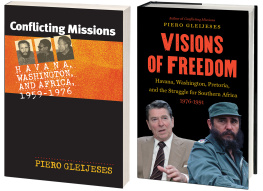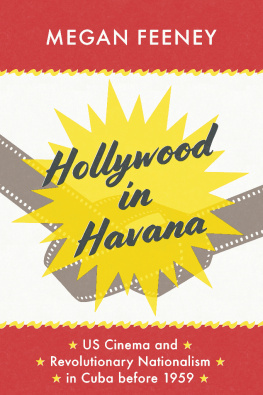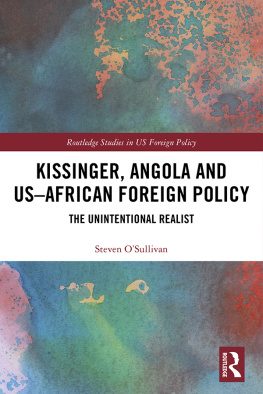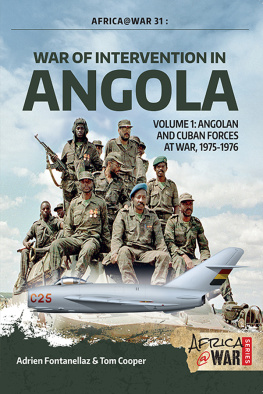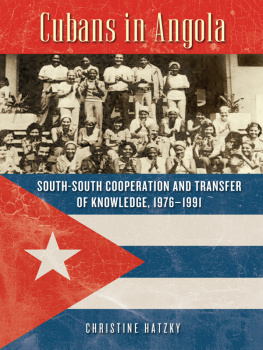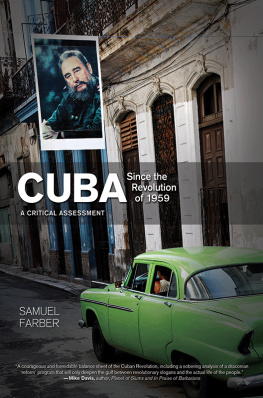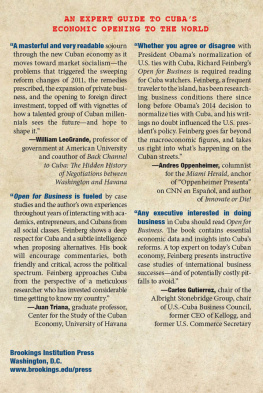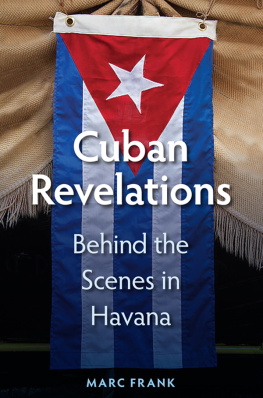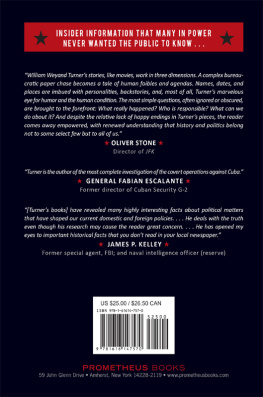Conflicting Missions
ENVISIONING CUBA
LOUIS A. PREZ JR., EDITOR
2002 The University of North Carolina Press
All rights reserved
Designed by April Leidig-Higgins
Set in Berkeley by Keystone Typesetting, Inc.
Manufactured in the United States of America
The publication of this book was supported by a generous contribution from the Charlotte M. Morehouse Charitable Remainder Trust Fund of the Paul H. Nitze School of Advanced International Studies of the Johns Hopkins University and was assisted by the William Rand Kenan Fund of the University of North Carolina Press.
The paper in this book meets the guidelines for permanence and durability of the Committee on Production Guidelines for Book Longevity of the Council on Library Resources.
Library of Congress Cataloging-in-Publication Data
Gleijeses, Piero. Conflicting missions : Havana, Washington, and
Africa, 1959-1976 / by Piero Gleijeses.
p. cm. (Envisioning Cuba)
Includes bibliographical references (p. ) and index.
ISBN 0-8078-2647-2 (cloth: alk. paper)
ISBN 0-8078-5464-6 (pbk.: alk. paper)
1. CubaForeign relationsAfrica. 2. AfricaForeign relations Cuba. 3. CubaForeign relations1959 4. AfricaForeign relations1960 5. United StatesForeign relationsAfrica. 6. AfricaForeign relationsUnited States. 7. United States Foreign relations19451989. 8. National liberation movements Africa. 9. Cold War. 1. Title, II. Series.
DT38.9.C9 G057 2001
327.72910609046dc21 2001027417
Portions of this work were previously published, in somewhat different form, as Cubas First Venture in Africa: Algeria, 1961-1965, Journal of Latin American Studies 28 (February 1996); The First Ambassadors: Cubas Contribution to Guinea-Bissaus War of Independence, Journal of Latin American Studies 29 (February 1997); and Flee! The White Giants Are Coming!: The United States, the Mercenaries, and the Congo, 1964-1965, Diplomatic History 18 (Spring 1994); they are reprinted here with permission of the publishers.
cloth: 06 05 04 03 02 5 4 3 2
paper: 07 06 05 04 03 5 4 3 2 1
To Setsuko Ono and Letterina Gleijeses
Contents
Illustrations
Let me take you to the Casbah
Sara Perell, a Cuban doctor in Algeria
CIA-sponsored mercenaries lead captured Zairean rebels to be hanged
Smiling mercenaries argue for the privilege of doing the stringing up
Che Guevara with Angolan rebel leaders in Brazzaville
Havana and Moscow, 1964: The tone was bitter
Vctor Dreke, Ches closest aide in Zaire
The Cubans leave Zaire
Che bids farewell to his men
The Cubans go to the Congo
The Cuban ambassador and two North Vietnamese doctors in Brazzaville
The best gift: Cubans carry out the first vaccination campaign against polio in the Congo
Angolan guerrilla women
Amlcar Cabral visits the Cuban military camp in Brazzaville
They called him The Wizard: A Cuban doctor in guerrilla territory in Guinea-Bissau
The first Cuban woman to fight in Africa
Castro as a Soviet puppet in Angola
Quifangondo: The battle to control Luanda
South African prisoners of war
Lord Kissinger Needs You
Knuckle-rapping
Castro plans his next move in Angola
Castro to South Africa: Withdraw or face a Cuban attack
Kissinger discovers Africa
Maps
Cuba
Africa
Algeria
Rebel Areas in Zaire, August 1964
Fizi-Baraka, Eastern Zaire, 1965
Central Africa
Cabinda, Angola
Dembos and Nambuangongo, Angola
Guinea-Bissau
Angola
Northern Angola
The South African Advance into Southern Angola
The Battle of Quifangondo, Angola
Military Situation in Angola, mid-November 1975
Angola, Central Front, NovemberDecember 1975
Acknowledgments
Setsuko Ono read this manuscript with insight and care. She was a tough but gracious critic who could always find the right words. Her comments, ever so insightful, ever so intelligent, stimulated me throughout my journey. Her literary flair, her talent and her sensitivity are clearly evident in her own bookchronicling her professional experience in international developmentwhich will soon appear in Japan and, I am confident, in the United States.
I benefited from the assistance and advice of Isaac Cohen, Margaret Crahan, Jim Hershberg, William LeoGrande, Wayne Smith, Gisela Garca Blanco, Christine Messiant, Peter Kornbluh, Arne Westad, Teresita Moz, Sergio Guerra, Jose Abilio Lomba Martins, Lars Rudebeck, Lou Prez, Joti Kohli, Kathrin Klein, Isabelle de Ruyth, Ben Jones, Jennifer Taylor, and Christopher Leroy. My visits to and from Africaat a time when my eyesight was very poorwould have been far less restful without the warm hospitality of my friend Elizabeth Faroudja in Paris, and my research in the Belgian archives would have been far less productive without the assistance of Ambassador Jean de Ruyth. Bringing this manuscript to press was eased enormously by the professionalism and grace of Elaine Maisner and her colleagues at the University of North Carolina Press.
Every archive I visited had a professional and courteous staff, but I have a particular soft spot for Regina Greenwell at the Lyndon B. Johnson Library and Jim Yancey at the Jimmy Carter Library. At SAIS, where I teach, three superb research librariansBarbara Prophet, Kathy Picard, and Linda Carlsonhelped me with great skill and good cheer. At the Central Committee of the Communist Party of Cuba, in Havana, Ivys Silva Jomarrn coordinated the flow of declassified Cuban documents with admirable efficiency, grace, and tact. When I began my research, I saw Ivys as a stern guardian; now I consider her a good and esteemed friend.
I suspect I would still be waiting for a visa to do research in Cuba had it not been for my dear friend Gloria Len, who was then the head of the U.S. section at the University of Havana. I had broached the idea of this book in Cuba in late 1991 and had received polite expressions of interest, but when I tried to return to Cuba the following spring to begin the research, I was unable to obtain a visa. Gloria began pestering the Cuban authorities on my behalf. She also enlisted the help of her friends, among them Oscar Garca, dean of the Instituto Superior de Relaciones Internacionales of Havana, who lent his prestige to my quest and invited me to lecture at his institute. Finally, in December 1993, I set foot in Havana again. There I met Jorge Risquet, a Central Committee member who had played an important role in Africa for many years and who had been in Guatemala as a young man. I had written a book about Guatemala. Risquet read it, found it honest (although ideologically weak), and a link was established that led to the authorities decision to grant me access to the archives. None of this would have been possible without Glorias relentless efforts and Oscar Garcas courage in sponsoring a foreigner who not only has contacts with CIA officials as part of his academic research but was rumored to be a CIA agent himself.
My debt to Gloria has grown over the years. Throughout, she has remained my invaluable adviser. She helps me understand things Cuban. I hate to think how many gaffes and faux pas I would have made during the six years I researched this book had I not been able to count on her advice and guidance.
In Havana, I acquired thousands of pages of documents and also three dear friends who helped me to understand their country: Antonio Lpez Lpez, a lover of history, taciturn, warm, and deeply intelligent; Hedelberto Lpez Blanch, an irreverent and brilliant journalist; and Roberto Gonzlez Gmez, one of Cubas most insightful intellectuals, who read several drafts of my manuscript and was unstinting with his penetrating criticism.
Next page

